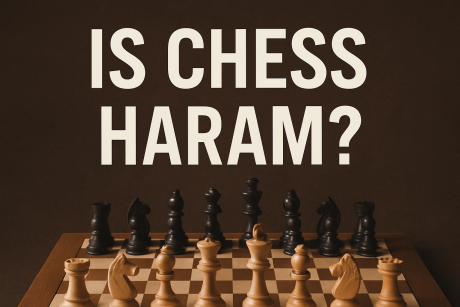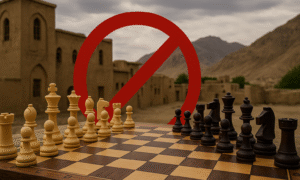Recently, Afghanistan made headlines with the controversial decision to ban chess, declaring it “haram” (forbidden) under their interpretation of Islamic law. This has sparked debates about whether chess is truly forbidden for Muslims, or if the ban is based on a misinterpretation of Islamic teachings. But is there any proof in the Holy Books that chess is haram? Is chess haram? Let’s explore this issue in more depth.
Disclaimer: Since the as a chess platform we’re not religious platform, so all the information mentioned here is the result of research after the the ban on chess in Afghanistan.
Is Chess Actually Haram in Islam?
Many believe that chess is haram because it could lead to gambling, or that it might waste time and distract people from their religious duties. However, there is no direct mention of chess in the Quran. This means that there is no clear, authoritative text in Islamic scripture that specifically forbids the game.
Islamic law generally prohibits activities that lead to harm, such as gambling and neglect of religious obligations. However, chess itself, as a strategic board game, does not inherently involve either of these elements. In fact, it can be seen as an intellectual pursuit, encouraging critical thinking, strategy, and patience.
The Misinterpretation of Chess as Haram
Some Islamic scholars, particularly those in conservative communities, have labeled chess as haram, largely due to its association with gambling in some cultures. However, this view is not universally accepted among Muslims. Many scholars argue that the prohibition stems from cultural or historical contexts, rather than clear religious doctrine.
Islamic teachings emphasize the importance of intention. If a person plays chess in moderation, with the goal of intellectual stimulation or recreation, and without neglecting religious duties, there is no reason for it to be considered haram. In fact, many Muslim-majority countries, including in the Middle East, embrace chess as a game that develops the mind and fosters healthy competition.
Afghanistan’s Decision: A Cultural and Political Move
In May 2025, the Taliban government in Afghanistan banned chess, citing religious concerns. However, the lack of direct evidence from the Quran or Hadith makes this decision more about political control than religious doctrine. The Taliban has been criticized for using religion as a means to restrict freedoms and suppress cultural diversity.
It’s important to note that Afghanistan’s stance on chess is not a reflection of the wider Islamic world. Other Muslim-majority countries, such as those in the Arab world, Pakistan, and Indonesia, not only allow chess but encourage it as an intellectual pursuit. This discrepancy highlights the diversity within the interpretation of Islamic law across different regions.
The Real Issue: Intellectual Freedom vs. Cultural Control
The controversy surrounding Afghanistan’s chess ban raises broader questions about freedom of thought and cultural expression. The claim that chess is haram appears to be a personal interpretation rather than a universally agreed-upon religious stance. Most Muslims around the world continue to enjoy chess without it conflicting with their faith, as there is no evidence to suggest that the game itself is haram.
Conclusion: Chess is Not Haram in Islam
Based on Islamic teachings, there is no evidence in the Quran or Hadith that chess is haram. The prohibition seen in some parts of the Muslim world, such as Afghanistan, is a matter of cultural interpretation rather than religious law. Chess, when played responsibly and in moderation, does not contradict the values of Islam. Instead, it can be a valuable tool for enhancing mental faculties and promoting strategic thinking.
As we move forward, it’s important to understand that interpretations of Islamic law can vary widely, and what one group sees as forbidden might not be viewed the same way by others. For most Muslims, chess remains an enjoyable, harmless pastime that has no conflict with their faith.




